新编英语教程6 unit4
6(第二版)全新版大学英语综合教程4_Unit6课后练习答案
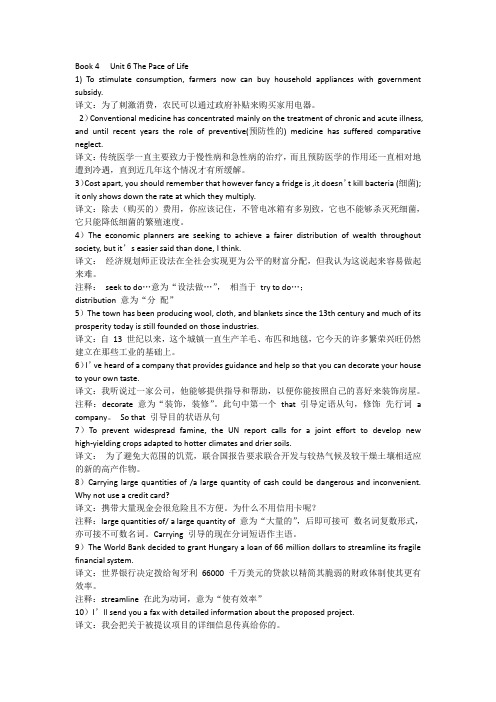
Book 4 Unit 6 The Pace of Life1) To stimulate consumption, farmers now can buy household appliances with government subsidy.译文:为了刺激消费,农民可以通过政府补贴来购买家用电器。
2)Conventional medicine has concentrated mainly on the treatment of chronic and acute illness, and until recent years the role of preventive(预防性的) medicine has suffered comparative neglect.译文:传统医学一直主要致力于慢性病和急性病的治疗,而且预防医学的作用还一直相对地遭到冷遇,直到近几年这个情况才有所缓解。
3)Cost apart, you should remember that however fancy a fridge is ,it doesn’t kill bacteria (细菌); it only shows down the rate at which they multiply.译文:除去(购买的)费用,你应该记住,不管电冰箱有多别致,它也不能够杀灭死细菌,它只能降低细菌的繁殖速度。
4)The economic planners are seeking to achieve a fairer distribution of wealth throughout society, but it’s easier said than done, I think.译文:经济规划师正设法在全社会实现更为公平的财富分配,但我认为这说起来容易做起来难。
注释:seek to do…意为“设法做…”,相当于try to do…;distribution 意为“分配”5)The town has been producing wool, cloth, and blankets since the 13th century and much of its prosperity today is still founded on those industries.译文:自13 世纪以来,这个城镇一直生产羊毛、布匹和地毯,它今天的许多繁荣兴旺仍然建立在那些工业的基础上。
新编英语教程(基础英语)第三版4unit6课文详解及练习答案
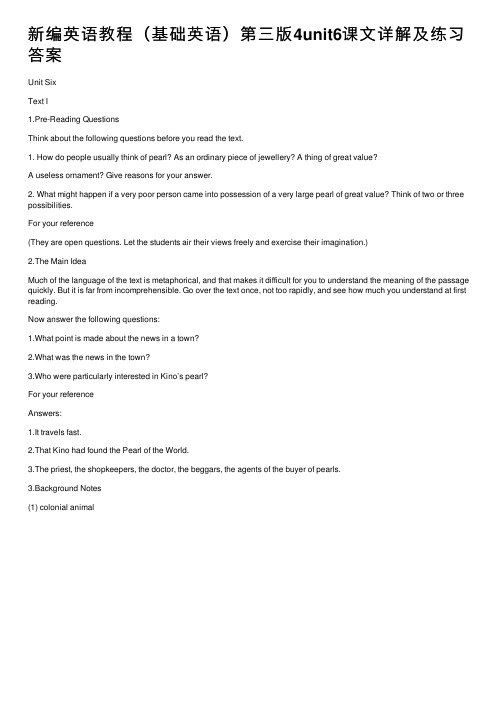
新编英语教程(基础英语)第三版4unit6课⽂详解及练习答案Unit SixText I1.Pre-Reading QuestionsThink about the following questions before you read the text.1. How do people usually think of pearl? As an ordinary piece of jewellery? A thing of great value?A useless ornament? Give reasons for your answer.2. What might happen if a very poor person came into possession of a very large pearl of great value? Think of two or three possibilities.For your reference(They are open questions. Let the students air their views freely and exercise their imagination.)2.The Main IdeaMuch of the language of the text is metaphorical, and that makes it difficult for you to understand the meaning of the passage quickly. But it is far from incomprehensible. Go over the text once, not too rapidly, and see how much you understand at first reading.Now answer the following questions:1.What point is made about the news in a town?2.What was the news in the town?3.Who were particularly interested in Kino’s pearl?For your referenceAnswers:1.It travels fast.2.That Kino had found the Pearl of the World.3.The priest, the shopkeepers, the doctor, the beggars, the agents of the buyer of pearls.3.Background Notes(1) colonial animalA colonial animal is an association of individual organisms that are incompletely separated. Life forms such as corals and moss animals are good examples of colonial animals. They are individual organisms that normally exist in mass of large collections.4.TextThe PearlKino, a poor fisherman, has just found a very large and valuable pearl and is going to the nearest town to sell it. He needs money urgently to get medical help for his baby who has just been stung by a scorpion. Before Kino found the pearl, the only doctor available had refused to treat the baby because Kino could not afford to pay for the treatment.A town is a thing like a colonial animal. A town has a nervous system and a head and shoulders and feet. (1)A town is a thing separate from all other towns, so that there are no two towns alike. (2)And a town has a whole emotion. How news travels through a town is a mystery not easily to be solved. News seems to move faster than small boys can (1)scramble and (2)dart to tell it, (3)faster than women can call it over the fences.(4)Before Kino and Juana and the other fishers had come to Kino’s brush house, the nerves of the town were pulsing and (3)vibrating with the news — Kino had found the Pearl of the World. Before panting little boys could strangle out the words, their mothers knew it. (5)The news swept on past the brush houses, and it washed in a foaming wave into the town of stone and plaster. It came to the priest walking in his garden, and it put a thoughtful look in his eyes and a memory of certain repairs necessary to the church. He wondered what the pearl would be worth. And he wondered whether he had baptized Kino’s baby, or married him (6)for that matter. The news came to the shopkeepers and they looked at men’s clothes that had not sold so well.The news came to the doctor where he sat with a woman whose illness was age, thoughneither she nor the doctor would admit it. And when it was made plain who Kino was, the doctor grew (4)stern and(5)judicious at the same time. “He is (7)a client of mine,” the doctor said. “I am treating his child for a scorpion sting.” And the doctor’s eyes rolled up a little in their fat hammocks and he thought of Paris. He remembered the room he had lived in there as a great and (6)luxurious place. The doctor looked past his (7)aged patient and saw himself sitting in a restaurant in Paris and a waiter was just opening a bottle of wine.The news came early to the beggars in front of the church, and it made them giggle a little with pleasure, for they knew that (8)there is no (8)alms-giver in the world like a poor man who is suddenly lucky.Kino has found the Pearl of the World. In the town, in little offices, sat the men who bought pearls from the fishers. They waited in their chairs until the pearls came in, and then they (9)cackled and fought and shouted and threatened until they reached the lowest price the fisherman would stand. But there was a price below which they dared not go, for it had happened that a fisherman in despair had given his pearls to the church. And when the buying was over, these buyers sat alone and their fingers played (10)restlessly with the pearls, and they wished they owned the pearls. For there were not many buyers really —there was only one, and he kept these agents in separate offices to give a (9)(11)semblance of competition. The news came to these men, and their eyes (12)squinted and (10)their finger-tips burned a little, and each one thought how the (13)patron could not live forever and someone had to take his place. And each one thought how with some capital he could get a newstart.All manner of people grew interested in Kino — people with things to sell and people with favors to ask. Kino had found the Pearl of the World. (11)The essence of pearl mixed with essence of men and a curious dark (14)residue was (15)precipitated. Every man suddenly became related to Kino’s pearl, and Kino’s pearl went into the dreams, the speculations, the schemes, the plans, the futures, the wishes, the needs, the lusts, the hungers, of everyone, and only one person stood in the way and that was Kino, so that he became curiously every man’s enemy. The news stirred up something infinitely black and evil in the town; (12)the black (16)distillate was like the scorpion, or like hunger in the smell of food, or like loneliness when love is (17)withheld. The poison sacs of the town began to manufacture (18)venom, and (13)the town (19)swelled and (20)puffed with the pressure of it.By John Steinbeck (an excerpt)Words and phrases: (点击⽂中红⾊单词或词组,出现该红⾊部分及e.g.字样,再单击e.g. ,出现例句)1.scramble:v. move somewhere in a hurried awkward waye.g. The man scrambled to his feet(=stood up very quickly and awkwardly)and hurried intothe kitchen.Your students may scramble up the bank of the river to follow you.2.dart: v. move suddenly and quickly in a particular directione.g. His teacher darted forward and pulled him away from the fire.The guard pulls the fire alarm, and the elevator stops, giving the passengers time todart down the stairwell.3.vibrate: v. shake quickly and continuously with very small movementse.g. The floor was vibrating to the beat of the music.The sea began to vibrate with waves that spread out in a circle.4.stern: a. serious and strict, and showing strong disapproval of someone's behaviore.g. Father looked stern at us for a while, and then we went to watch him hunt.Now it takes a stern soul to resist the temptation to check the headlines at least oncewhile you're away.5.judicious: a. done in a sensible and careful waye.g. In an environment of multiple campaigns promoting judicious antibiotic use in children,identification of effective strategies is important.Meditators should learn how to be judicious without being judgmental.6.luxurious: a. very expensive, beautiful, and comfortablee.g. She tried hard to retrieve her luxurious life.The luxurious liner is cleaving through the waves.7.aged: a. advanced in yearse.g. I well remember taking my aged grandfather across a road.He is aged, but his memory is still good.8.alms-giver: n. people who give money, food etc. to poor peoplee.g. But William is an entrepreneur, not just an alms-giver.There can be no friendship between a beggar and an alms-giver.9.cackle: v. laugh in a loud unpleasant way, making short high soundse.g. The women cackled when they saw the movie star step out of the limousine.The teacher let us cut the cackle in the class.10.restlessly: adv. act unwillingly to keep still or stay where a person is, especially because he or she is bored, impatient, or dissatisfied, and wants to do something elsee.g. I bought a rose and restlessly searched for her in the restaurant.As for poor Leo, after turning restlessly for hours, at last he had dropped off into asleep or stupor.11.semblance: n. a situation, condition etc. that is close to or similar to a particular one, usuallya good onee.g. After the war, life returned to a semblance of normality.Pursuing name brands can only create the semblance of wealth, not win actual respect.12.squint: v. look at something with eyes partly closed in order to see bettere.g. He also seems to be slightly blinded by the sun, causing him to squint.Increase the text size if you can. Small text that forces you to squint is much harder onthe eyes.13.patron: n.someone who supports the activities of an organization, for example by giving moneye.g. A patron of the arts should have deep pockets.He was warmly welcomed at the annual meeting as a celebrated patron of the Hope Project. 14.residue: n. a substance that remains on a surface, in a container etc. and cannot be removed easily, or that remains after a chemical processe.g. In the United States, shredders generate about 5 million tons of shredder residue every year.Recently the reports on pesticide residue and unsafe bottled drinking water haveprompted government action.15.precipitate: v. separate a solid substance from a liquid by chemical action, or to be separated in this waye.g. Diamond is precipitated from the kimberlite magma.If the blood acid content increased, it will also precipitate the formation of stones.16.distillate: n. a purified liquid produced by condensation from a vapor during distilling; the product of distillinge.g. Most ships run on bunker fuel, which is cheaper than distillate, but more polluting.U.S. distillate fuel consumption fell 4% last year as a mild winter curbed heating oiluse.17.withhold: v. refuse to give someone somethinge.g. Jack was accused of withholding vital information from the police.The boss withheld payment until they had completed the work.18.venom: n. a liquid poison that some snakes, insects etc. produce when they bite or sting youe.g. The infection or venom from the bite could kill my sheep.The drugs are developed from the venom of poisonous snakes.19.swell: v. become larger and rounder than normal, especially about parts of the bodye.g. His ankle was already starting to swell.The little girl’s arm was beginning to swell up where the bee had stung her.20.puff: v. become bigger by increasing the amount of air inside, or to make something bigger inthis waye.g. He would surely puff out if he ate everything he wanted.Her eyes were puffed from lack of sleep.Notes (点击⽂中蓝⾊字体,出现该内容,再点击,出现下⾯的注释内容)1. A town is a thing separate from all other townsA town is detached from / apart from all other towns; in other words, each town is a separateentity, not joined to or connected with any other town.2.And a town has a whole emotion.This is an example of metaphor. A town is compared to a living being with feelings of all kinds — love, joy, hate, fear, grief, etc.3.faster than women can call it over the fencesfaster than women can talk about it to their neighbours over the fences that separate theirhomes4.Before ... the nerves of the town were pulsing and vibrating with the news — Kino hadfound the Pearl of the World.Before ... the town was alive with the news that Kino had found the Pearl of the World. Here the author wants to show us how fast news travelled. Kino found the Pearl of the World when he was out fishing, but before he reached home, the news had already spread through thewhole town and was on everyone’s lips.5.The news swept on past the brush houses and it washed in a foaming wave into the townof stone and plaster.The brush houses, referring to the houses in the area where the poor fishermen live, which is presumably just outside the town, form a strong contrast with the town of stone and plaster, where the priest, shopkeepers, doctor, and pearl buyers live. Note also how the author uses the figurative language to make the scene more vivid, comparing the news to a body ofwater that swept on and washed in a foaming wave.6.for that matterThis phrase gives emphasis to what he had said. In other words, if he had baptized Kino’s baby or had married him, Kino would be grateful to him and would show him his gratitude.7. a client of mineA client is a person who gets help or advice from any kind of professional. Usually, however,a lawyer has a “client”, whereas a doctor has a “patient” and a shopkeeper has a “customer”.8.there’s no alms-giver in the world like a poor man who is suddenly luckyA poor man who becomes suddenly rich is more generous than any alms-giver.alms — money, clothes or food given to the poor (usually money)Alms has only one form for both singular and plural.Other examples of nouns with plural forms:earnings, savings, surroundings, belongings, goods, remains, headquarters, thanks9. a semblance of competitionan outward appearance of competition that aimed to fool the fishermen10.their finger-tips burned a littleeach of them felt a little uneasy, hoping to start a pearl buying business of his own11.The essence of pearl mixed with essence of men and a curious dark residue wasprecipitated.The great value of the pearl and man’s insatiable desire to possess wealth combine to form a strange sort of wickedness / a strange wicked greed quickly.12.the black distillatea metaphor for the deep, evil feelings and desires of people who were affected by the news13.the town swelled and puffedthe town became vain and conceited / was filled with self-interest and vanity/doc/98cccd42aa114431b90d6c85ec3a87c241288a48.html ments on the TextThis excerpt is a good example of creativity in writing. It describes the psychology of various kinds of people just before Kino, a poor fisherman, goes to the town to sell the Pearl of the World, which he has found in the sea. The writer, through his excellent use of language, sets the scene for Kino’s arrival in the town and the reader is likely to anticipate with interest the meeting between him and the pearl buyers.What makes it possible for the writer to produce such vivid and immediate description, which leaves the reader with a profound impression of the town, its people and the forces at work in it?1. His close contact with and awareness of different types of people.2. His thorough and profound understanding of “human nature”.3. His keen power of observation and active imagination.4. His effective use of language.6.ExercisesA. Answer the following questions.(先单击出现⿊⾊问题, 后单击出现蓝⾊答案)1. At what point in the story is the scene of this extract set?It is set before the arrival in town of the central figure, Kino. Kino is going to sell his newly found Pearl of the World.2. What personal details do we know about Kino?Kino is a poor fisherman who lives in a brush house. He has a child. He is in great need of money because his child has been stung by a scorpion and needs treatment. He is eager to sell the pearltoget money to pay for medical treatment of the sting.3. Why does the writer tell us that the shopkeepers looked at men’s clothes that had not sold so well?The shopkeepers are concerned about their business which has not been brisk, so there are a lot of men’s clothes in stock. When they learn that Kino has found a valuable pearl, they think of Kino as a possible buyer of the men’s clothes. Steinbeck tells us about the shopkeepers as an illustration of the effect of Kino’s find on other people.4. What details are given to describe the doctor’s appearance and his thoughts?Why does the writer want to supply us with such information?The doctor “grew stern and judicious at the same time” and his “eyes rolled up a little in their fat hammocks”, which suggests that he is immediately aware of what treating Kino’s child might mean for him. He thinks of Paris, recalling his room there as “a great and luxurious place” and imagines himself eating and drinking in a Parisian restaurant. The writer gives the reader this description to remind us that doctors whose work is curing people can be as money-oriented and pleasure-seeking as anyone else. This acts as a statement about “human nature”.5. How does the writer prepare the stage fo r a “battle” between the pearl buyers and Kino? How does the writer make the reader anticipate the meeting?The writer prepares the stage for the battle by telling us that the pearl buyers were experienced in bargaining with and “beating down” the pearl se llers. As Kino is presumably eager to get as much money as possible because of his child, the reader is likely to be looking forward with interest to the meeting of the two parties.6. Who do “the people with things to sell” and “the people with favours to ask” include?“The people with things to sell” include:1) the priest (who sells spiritual comfort)2) the shopkeepers (who sell men’s clothes)3) the doctor (who sells his medical skill)“The people with favours to ask” include:1) the beggars in front of the church2) the other poor fishers7. What does the writer mean by “The essence of pearl mixed with essence of men and a curious dark residue was precipitated”?The sentence can be interpreted as: The combination of the inestimable value of pearl and the fundamental human vice —greed — resulted in evil intentions and malicious plots. The writer wants to show that when people are obsessed with the idea of money, they are very likely to do evil things.B. Explain the following in your own words.(先单击出现⿊⾊问题, 后单击出现蓝⾊答案)1. Before panting little boys could strangle out the words, their mothers knew it.The mothers had already learned the news before their sons could stammer it out.2. The news swept on past the brush houses, and it washed in a foaming wave into the town of stone and plaster.The news spread from one brush house to another and continued to travel fast into the town.3. And when it was made plain who Kino was, the doctor grew stern and judicious at the same time.When the doctor realized that Kino was the man who had asked for his help, he became both serious(about the treatment) and wise / clever (about how he could gain).4. And the doctor’s eyes rolled up a little in their fat hammocks and he thought of Paris.For a moment the doctor’s eyes were focused on nothing as his thoughts turned to Paris.5. The news stirred up something infinitely black and evil in the town; the black distillate was like the scorpion, or like hunger in the smell of food, or like loneliness when love is withheld.The news caused a profound “negative force” to be at work in the town. This could be compared to a scorpion, which causes pain, or the hunger created by the smell of food, or feeling of loneliness which comes when love is refused.6. The poison sacs of the town began to manufacture venom, and the town swelled and puffed with the pressure of it.What acted as the “venom-producing bag” of the town, i.e., the increasing self-interest in the townspeople, began to create poison which afflicted the whole town with a negative force.。
新编英语教程(基础英语)第三版第四册课文翻译Book 4 Unit 6珍珠_英中对照
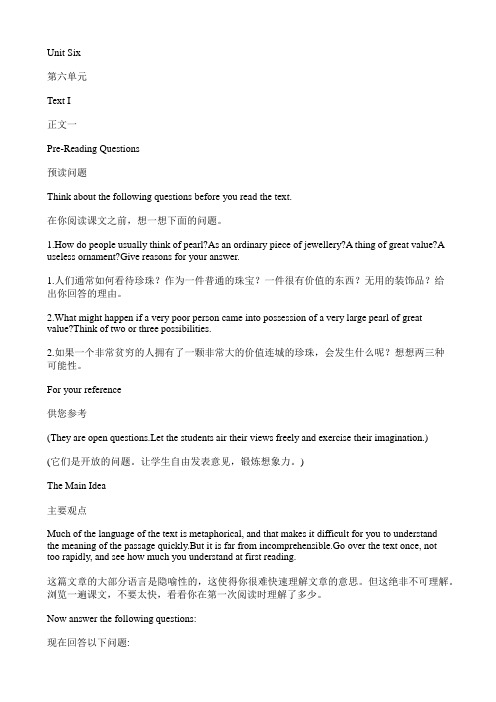
Unit Six第六单元Text I正文一Pre-Reading Questions预读问题Think about the following questions before you read the text.在你阅读课文之前,想一想下面的问题。
1.How do people usually think of pearl?As an ordinary piece of jewellery?A thing of great value?A useless ornament?Give reasons for your answer.1.人们通常如何看待珍珠?作为一件普通的珠宝?一件很有价值的东西?无用的装饰品?给出你回答的理由。
2.What might happen if a very poor person came into possession of a very large pearl of great value?Think of two or three possibilities.2.如果一个非常贫穷的人拥有了一颗非常大的价值连城的珍珠,会发生什么呢?想想两三种可能性。
For your reference供您参考(They are open questions.Let the students air their views freely and exercise their imagination.)(它们是开放的问题。
让学生自由发表意见,锻炼想象力。
)The Main Idea主要观点Much of the language of the text is metaphorical, and that makes it difficult for you to understandthe meaning of the passage quickly.But it is far from incomprehensible.Go over the text once, nottoo rapidly, and see how much you understand at first reading.这篇文章的大部分语言是隐喻性的,这使得你很难快速理解文章的意思。
新编英语教程6unit 4
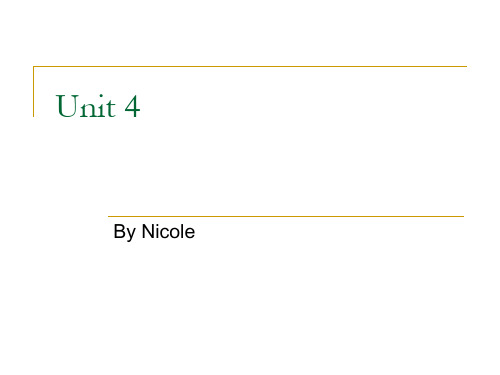
7. flagrant: shameless; notorious (notoriety); particularly bad, shocking and obvious: flagrant breach of justice公然违反公正原则 a flagrant offence 大罪, 重罪 flagrant crime 滔天罪行 a flagrant error明显的错误 a flagrant sinner罪恶昭彰的罪犯
exemption ...the exemption of employer-provided health insurance from taxation. 雇主提供的健康保险免税 ...new exemptions for students and the low-paid. 对学生和低收入者的最新豁免
Why do people break the law?
Can you give some cases of law-breaking?
Paragraph 1
Millions of Americans are taking increasing liberties with the legal codes.
Para. 2
Scofflaws abound in amazing variety
Variety:
The Graffiti-prone: Bicyclist: Litter bugs: Public places of high-decibel portable radios Beer-soaked hooliganism Tobacco addicts Dressed pot smokers The use of cocaine The Jaywalkers Pay attention to sentence structures
新编英语教程6unit 4 A red light for scofflaws

Examples Statistics red-light runner Para. 4 The most flagrant scofflaw is the ________________. Examples Quotation
III. (Para. 5-8) Dangers of scofflaws Para. 5 The flouting of basic rules harms society because respect scofflaws show no ____________ to the social rules and contempt display ______________ for the fundamentals of order. Para. 6 Today scofflawry is pervasive and represents the elementary social demoralization _________________________________________. Example Para. 7 The scofflawry is not only a matter of etiquette. It may violent crimes lead to _____________________________. Examples
P2
abound: v. be plentiful (l. 11) e.g. Rumors abound as to the reason for his resignation. Sarcasm abounds in “Fortress Besieged”. flurry: abundance, great quantity pass around: offer flagrant: notorious What does “hello, Everybody” mean?
新编英语教程6 Unit 4 The Lady,or the Tiger Part 1
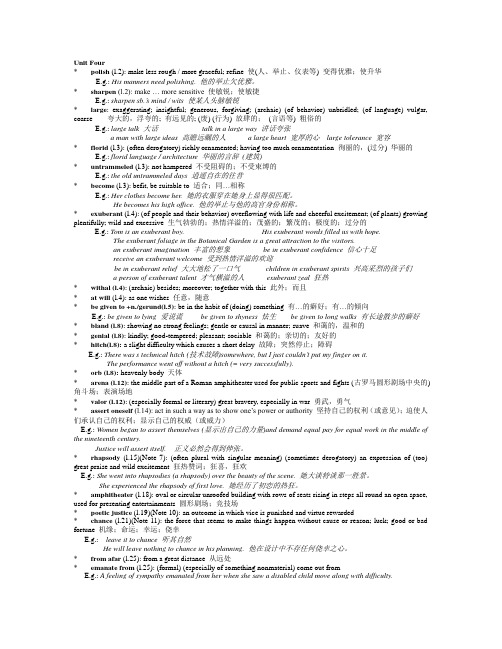
Unit Four*polish (l.2):make less rough / more graceful; refine 使(人、举止、仪表等) 变得优雅;使升华E.g.: His manners need polishing. 他的举止欠优雅。
*sharpen (l.2): make … more sensitive 使敏锐;使敏捷E.g.: sharpen sb.’s mind / wits 使某人头脑敏锐*large: exaggerating; insightful; generous, forgiving; (archaic) (of behavior) unbridled; (of language) vulgar, coarse 夸大的,浮夸的; 有远见的; (废) (行为) 放肆的;(言语等) 粗俗的E.g.: large talk 大话talk in a large way 讲话夸张a man with large ideas 高瞻远瞩的人 a large heart 宽厚的心large tolerance 宽容*florid (l.3): (often derogatory) richly ornamented; having too much ornamentation 徇丽的,(过分) 华丽的E.g.: florid language / architecture 华丽的言辞(建筑)*untrammeled (l.3): not hampered 不受阻碍的;不受束缚的E.g.: the old untrammeled days 逍遥自在的往昔*become (l.3): befit, be suitable to 适合;同…相称E.g.: Her clothes become her. 她的衣服穿在她身上显得很匹配。
He becomes his high office. 他的举止与他的高官身份相称。
外研社,新编大学英语综合教程4,Unit6 Risk,Quiz
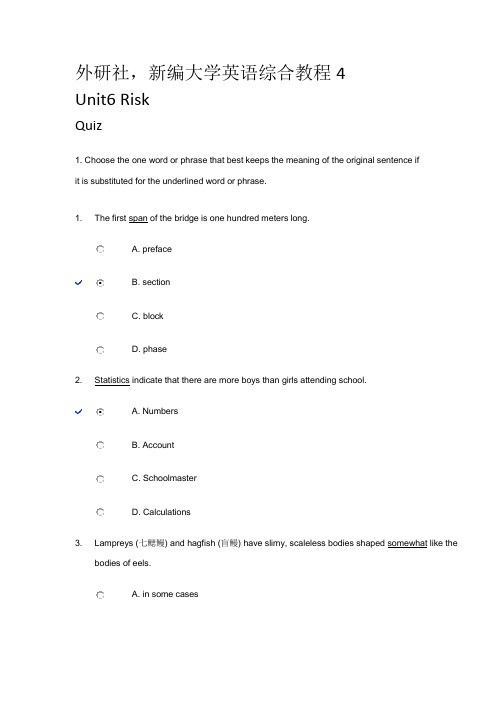
外研社,新编大学英语综合教程4Unit6RiskQuiz1. Choose the one word or phrase that best keeps the meaning of the original sentence ifit is substituted for the underlined word or phrase.1. The first span of the bridge is one hundred meters long.A. prefaceB. sectionC. blockD. phase2. Statistics indicate that there are more boys than girls attending school.A. NumbersB. AccountC. SchoolmasterD. Calculations3. Lampreys (七鳃鳗) and hagfish (盲鳗) have slimy, scaleless bodies shaped somewhat like thebodies of eels.A. in some casesB. at some timesC. to some degreeD. for some reasons4. De Vaca did the only wise thing by asking the Indians for food and shelter in their village.A. sensitiveB. sensibleC. sentimentalD. sensational5. The United States was a divided nation in 1850—half slave and half free.A. alliedB. combinedC. separatedD. united6. Virtually all species of animals communicate either through sounds or through a large repertory ofsoundless codes.A. SimultaneouslyB. AbsolutelyC. BasicallyD. Almost7. A baby's blood has slightly more hemoglobin (血红素) than that of an adult.A. noB. a littleC. evenD. very much8. In a 1983 newspaper poll, Ann Landers, an advice columnist, was listed among the twenty-fivemost influential women in the United States.A. surveyB. articleC. headlineD. conference9. A fundamental premise (前提) of a free-enterprise economic system is that all small business facedifficult competition.A. confrontB. takeC. loseD. appreciate10. A cup of whole milk provides roughly one hundred and sixty-six calories (热量) of energy.A. barelyB. coarselyC. onlyD. approximately11. Tanagers (唐纳雀) are usually found in the forests, where they feed on insects, fruits, and flowers.A. huntB. eatC. keepD. see12. Probability is the mathematical study of the likelihood of an event's occurrence.A. predictabilityB. possibilityC. feasibilityD. undeniability2. Choose appropriate words to complete the following passage.Where do pesticides (杀虫剂) fit into the picture of environmental disease? We have seen thatthey now soil, water, and food, and that they have the to make our streams fishless and our gardens and woodlands silent and birdless. Man, (15)he may like to pretend the contrary, is part of nature. Can he escape a pollutionthat is now so thoroughly throughout our world?We know that even single exposures these chemicals, if the amount is (18)sudden illness or death of farmers, farm workers, and others sufficient quantities of pesticides is very sad and should not occur. For the population as a whole, we must bemore with the delayed effects of absorbing small amounts of pesticides thatpollute our world.Responsible public health officials have that the biological (23)of chemicals are cumulative (累积的) over long periods of time, and that the danger tothe individual may the sum of the exposures received throughout his or her lifetime. For these very reasons the danger is easily ignored. It is human nature to shake off (摆脱,避开) may seem to us a threat of future disaster. "Men are naturally most impressed bydiseases which have obviousof their worst enemies slowlyYour answer Correct answer(13) pollute pollute(14) power power(15) however much however much(16) distributed distributed(17) toto(18) large enough large enough (19) exposed to exposed to (20) concerned concerned (21) invisibly invisibly (22) pointed out pointed out (23) effects effects (24) depend on depend on (25) what what (26) signs signs (27)approachapproach3. Complete the following sentences by translating the Chinese into English.28.If you are aware of what behavior is being rewarded in a given situation,你便可以随之改变你的行为). (accordingly)Your answerSuggested answeryou can change your behavior accordinglyyou can change your behavior accordingly29.收入减少大约56%) uponretirement among a sample of about 2,000 people. (approximately, reduction)Your answerSuggested answeran approximately 56 percent reduction in incomean approximately 56 percent reduction in income30.Plastic bags are useful for holding many kinds of food,因为它们的干净、有韧性和低成本).(by virtue of, toughness)Your answerSuggested answerby virtue of their cleanness, toughness, and low costby virtue of their cleanness, toughness, and low cost31.The military fathers often believe that if they seek help for a problem, they may冒着使他们处于非常不利境地的风险) and thus ruin their career. (risk the danger of)Your answer Suggested answerrisk the danger of putting themselves in very unfavorable conditionsrisk the danger of putting themselves in very unfavorable conditions32.要成为一名合格的医生),you have to study a long time andpass exams. (qualify)Your answerSuggested answerTo be qualified as a doctorTo be qualified as a doctor 33. 人造丝绸看起来和摸起来很像天然丝绸),but people still prefer that latter.Your answer Suggested answerArtificial silk looks and feels much likenatural oneArtificial silk looks and feels much like natural one34.应我需要一名合格秘书的要求). (in response to)Your answerSuggested answerin response to my request for aqualified secretaryin response to my request for a qualified secretary35. 艺术不仅反映一个民族的政治价值观),but also religious beliefs, emotions, and psychology. (reflect)Your answer Suggested answerArt reflects not only the political values of a people Art reflects not only the political values of a people36.In many businesses, 计算机已在很大程度上替代了日常的文书工作), because they are fast, flexible, and reliable. (replace)Your answer Suggested answercomputers have largely replacedpaperworkcomputers have largely replacedpaperwork37.Usually, the more difficult a shrub (灌木) is to grow, 它的价格越高).Your answer Suggested answerthe higher its price the higher its price (is)。
新编英语教程6_答案_修订版_教师用书_李观仪

练习册:We may regard “if only” as indicating the past and “next time” the future, we all know the most important time is “now”, as past things could not be changed and future is based on “now”.I. 1. The old man was an eminent psychiatrist and the author was a client of his. (famous and respected within a particular profession)2. Refer to para. 1. To him, the session was just like “a flash of insight that leaves him a changed person—not only changed, but changed for the better.”3. The three speakers on the tape were all unhappy, and the two words they all used frequently in what they said were “if only.” What the old man wanted to point out to the author was that to keep saying “if only” would not change anything; on the contrary, it only kept the person facing the wring way—backward instead of forward. Thus it did more harm than good to the person who kept saying them. (See para. 15)4. Shift the focus; substitute “next time” for “if only”5. They point to entirely different mental directions; one is backward and negative, and the other forward and positive.6. It is instructive and inspirational.II. 1. The most inspiring and gratifying fact of life is the unexpected spark of enlightenment that makes you different and a better person than before.2. At last he walked over from the other side of the street, wrapped in his old-fashioned overcoat, his bald head covered by a shapeless felt hat. He looked like a dwarfish old man full of energy rather than a well-known psychiatrist.3. The next speaker on the tape was a woman who had remained single because she thought she was obliged to take care of her mother who was a widow. She still remembered and told others miserably about all the chances of marriage she had missed.4. Eventually, if you form a habit of sayi ng “if only”, the phrase can really turn to an obstruction, providing you with an excuse for giving up trying anything at all.5. …you are always thinking of the past, regretting and lamenting. You did not look forward to what you can do in the future at all.6. The Old Man said to me trickily, using the phrase “if only” on purpose, “If only we’d got here ten seconds earlier, we’d have caught the cab.” I laughed and understood what he meant. So I followed his advice and said, “Next time I’ll run faster”.III. 1. The whole plan fell through for want of fund.2. Newton is acknowledged as one of the world’s most eminent scientists.3. He calculates the cost of production with invariable accuracy.4. The spokesman of the corporation was berated for his irresponsible words.5. The young clerk from the commercial bankLANGUAGE WORKI. 1. C 2. C 3. D 4. B 5. C 6. A 7. D 8. A 9. D 10. B 11. A 12. B 13. C 14. D15. A 16. B 17. B 18. A 19. A 20. DIII. 1. predominantly, prevailing 2. preferential 3. tremulous 4. inadvisable, shrinkage 5. sensitive, terrorism/terror6. magnifying7. unapproachable, fictitious8. unbecoming/becoming9. unaccountable 10. disorientation 11. persuasion, entreaties 12. irremediableIV. 1. blame 2. reproached 3. blamed/reproached 4. reproached5. rebuke/reprimand6. reprimanded7. rebuke/scold/reprimand8. reprimanded9. reprimanded 10. scolded 11. reproach 12. scoldedV. 1. on 2. In 3. over 4. in 5. from 6. beneath 7. with 8. in 9. of 10. Since 11. to 12. in 13. with 14. with 15. between 16. with 17. to 18. In 19. on 20. In 21. to 22. on 23. in 24. likeVI. 1. ash 2. outbreaks 3. interval 4. eruption 5. volcanologist 6. which 7. lava 8. cone 9. flood 10. under 11. crater 12. began 13. cauliflower 14. like 15. andUnit TwoTEXT ITHE FINE ART OF PUTTING THINGS OFF未修订前的练习答案:I. Paraphrase the parts underlined in the following:“Never put off till tomorrow,” 1exhorted Lord Chesterfield in 1749, “what you can do today.”’ That the elegant earl never 2got around to marrying his so n’s mother and had a bad habit of keeping 3worthies like Dr. Johnson cooling their heels for hours in an anteroom 4attests to the fact that even the most well-intentioned men have been postponers ever. Quintus Fabius Maximus, one of the great Roman generals, was 5dubbed “Cunctator” (Delayer) for putting off battle 6until the last possible vinum break. Moses 7pleaded a speech defect to rationalize his reluctance to deliver Jehovah’s edict to Pharaoh. Hamlet, of course, raised procrastination to an art form.There are those who prepare their income taxes in February, prepay mortgages and serve precisely planned dinners at an 8ungodly 6: 30 p.m. The other half dine happily on leftovers at 9 or 10, misplace bills and 9file for an extension of the income tax deadline. They seldom pay credit-card bills until the 10apocalyptic voice of Diners threatens doom from Denver. They postpone, 11as Faustian encounters) visits to barbershop, dentist or doctor.Yet 12for all the trouble procrastination may incur, delay can often inspire and revive a creative soul.From Cunctator’ s day until this century, the art of postponement had been 13virtually a monopoly of the military (“Hurry up and wait”), diplomacy and the law. In former times, a British proconsul faced with a native uprising could comfortably 14ruminate about the situation with Singapore Sling” in hand. 15Blessedly, he had no flattering Telex to order in machine guns and fresh troops.Even 16where there is no will, there is a way. There is a difference, of course, between chronic procrastination and purposeful postponement, particularly 17in the higher echelons of business.The data explosion 18fortifies those seeking excuses for inaction —another report to be read, another authority to be consulted.His point is well 19taken. 20Bureaucratization, which flourished amid the growing burdens of government and the greater complexity of society, was designed to smother policymakers in blankets of legalism, compromise andreappraisal --- and thereby prevent hasty decisions from being made.Many languages are 21studded with phrases that refer to putting things off ---from the Spanish maiana to the Arabic bukrafil mishmish.There are all sorts of 22rationalizations: the pressure of teaching responsibilities at home, checking out the latest book, looking up another footnote.”To Georgia State Psychologist Joen Fagan, however; procrastination may be a kind of 23subliminal way of sorting the important from the trivial.It is something of 24a truism that to put off making a decision is itself a decision. The parliamentary process is essentially a system of delay and deliberation. So, 25for that matter, is the creation of a great painting, or 26an entree, or a book, or a building like Blenheim Palace, which took the Duke of Marlboro ugh’s architects and laborers 15 years to construct. In the process, the design can 27mellow and marinate.In other words, 28pace Lord Chesterfield, what you don’t necessarily have to do today, by all means put off until tomorrow.I. Paraphrase1. exhorted: urged strongly2. the elegant earl never got around to marrying his son's mother: found time for3. a habit of keeping worthies like Dr. Johnson cooling their heels for hours: men of importance like Dr. Johnson waiting4. That.…attests to the fact that: proves5. one of the great Roman generals was dubbed "Cunctator": named humorously6. for putting off battle until the last possible vinum break: until an effective defense deserving a celebration with champagne was ensureda speech defect, and that he had reasons for8. at an ungodly 6:30 p.m.: unreasonable9. to file for an extension of the income tax deadline: apply officially10.until the apocalyptic voice of Diners threatens doom from Denver: warning, suggests unavoidable destruction11.They postpone, as Faustian encounters, visits to barbershop: as if they will see devils13.the art of postponement had been virtually a monopoly of the military, diplomacy and the law: found almost only in the field of14.to ruminate about the situation with Singapore Sling in hand: go over in mind repeatedly and slowly15.Blessedly, he had no nattering Telex to order machine guns and fresh troops: fortunately, noisy16.Even there is no will, there is a way: there is no will to delay, there is a way to do so.17.in the higher echelons of business: in the case of higher levels18.The data explosion fortifies those seeking excuses for inaction: encourages, doing nothing19.His point is will taken: accepteddeveloped very quickly as a result of the expanding administrative structure and the greater complexity of society, were made to restrict policymakers, who have to be engaged in endless paperwork, mediation and reconsideration21.Many languages are studded with phrases that refer to putting things off: filled22.There are all sorts of rationalizations: reasons23.a kind of subliminal way of sorting the important from the trivial: way outside one's conscious awareness24.It is something of a truism: an undoubted truth25.for that matter: as further concerns the thing mentioned26.So…is the creation of an entree: a small carefully prepared meat dish27.the design can mellow and marinate: ripen and mature28.pace Lord Chesterfield: with all due respect toII. Rewrite the followingFor each of the sentences below, write a new sentence as close in meaning as possible to the original sentence by using the given words as the beginning.1. That the elegant earl never got around to marrying his son’s mother and had a bad habit of keeping worthies like Dr. Johnson cooling their heels for hours in an anteroom attests to the fact that even the most well-intentioned men have been postponers ever.The fact that even the most well-intentioned men have been postponers ever can be testified ___ by the elegant earl who never got around to marrying his son’s mother and had a bad habit of keeping worthies like Dr. Johnson cooling their heels for hours in an anteroom.2. Moses pleaded a speech defect to rationalize his reluctance to deliver Jehovah’s edict to Pharaoh.By saying that he had a speech defect, Moses rationalized his reluctance to deliver Jehovah’s edict to Pharaoh.3. Yet for all the trouble procrastination may incur, delay can often inspire and revive a creative soul.Although procrastination may incur, delay can, yet, often inspire and revive a creative soul.4. Bureaucratization, which flourished amid the growing burdens of government and the greater complexity of society, was designed to smother the policy-makers in blankets of legalism, compromise and reappraisal.The design of bureaucratization, which flourished amid the growing burdens of government and the greater complexity of society, was to smoother the policy-makers in blankets of legalism, compromise and reappraisal.5. There is a long and honorable history of procrastination to suggest that many ideas and decisions may well improve if postponed.Procrastination has been honored long, suggesting that many ideas and decisions may well improve if postponed.III. Translate the following into English1.事实上,拖延这种现象的漫长而骄人的历史本身就已经表明,许多构想和决定如果加以推迟可能会更为圆满。
新编英语教程6练习册句子翻译
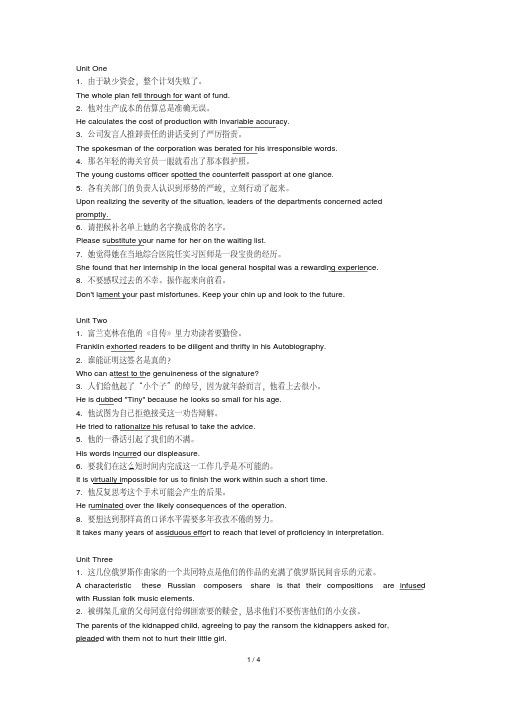
Unit One1. 由于缺少资金,整个计划失败了。
The whole plan fell through for want of fund.2. 他对生产成本的估算总是准确无误。
He calculates the cost of production with invariable accuracy.3. 公司发言人推卸责任的讲话受到了严厉指责。
The spokesman of the corporation was berated for his irresponsible words.4. 那名年轻的海关官员一眼就看出了那本假护照。
The young customs officer spotted the counterfeit passport at one glance.5. 各有关部门的负责人认识到形势的严峻,立刻行动了起来。
Upon realizing the severity of the situation, leaders of the departments concerned acted promptly.6. 请把候补名单上她的名字换成你的名字。
Please substitute your name for her on the waiting list.7. 她觉得她在当地综合医院任实习医师是一段宝贵的经历。
She found that her internship in the local general hospital was a rewarding experience.8. 不要感叹过去的不幸。
振作起来向前看。
Don't lament your past misfortunes. Keep your chin up and look to the future.Unit Two1. 富兰克林在他的《自传》里力劝读者要勤俭。
Franklin exhorted readers to be diligent and thrifty in his Autobiography.2. 谁能证明这签名是真的?Who can attest to the genuineness of the signature?3. 人们给他起了“小个子”的绰号,因为就年龄而言,他看上去很小。
新编大学英语综合教程UNIt 4课文翻译

大学英语综合教程(中职英语)Unit 4Passage ABefore you Read (读前思考)What kind of sports are you fond of? What is the sport you usually take part in?(你喜欢什么运动?你通常参加什么运动?)A Winning PersonalityPersonality 性格;魅力;气质——成功的人格Li Na started her sporting life with a badminton racket in her hand at age six. When she was eight, her coach discovered that she was using the racket more like a tennis player, and so a big decision was made.badminton racket 羽毛球拍coach 教练;长途汽车;训练。
racket 喧哗;诈骗;球拍。
more like 更接近于decision 决定,抉择;作决定;决策李娜六岁时就开始了她的运动生涯,手里拿着一个羽毛球球拍。
当她八岁的时候,她的教练发现她用球拍更像一个网球运动员,于是做出了一个重大决定。
Back home, Li told her mother: "I'm going to play tennis. " Surprised, her mother couldn't help asking:”What's tennis?”回到家里,李娜告诉妈妈:“我要去打网球。
”妈妈很惊讶,忍不住问:“网球是什么?”Twenty years later, Li stands out as the greatest woman tennis player in China. In 2011 Li won the French Open singles title, making her Asia's first and only Grand Slam singles champion, and rising to a career high ranking of world No. 4. This is really something to be proud of. Already the Chinese TV stations and newspapers have greeted her as a sporting heroine. Asian Tennis Federation has taken this opportunity to show that Li's success is living proof of Asia's ability to host a grand slam tournament. Currently the World No. 5 and Chinese No. 1, Li has become the best of what the Chinese call the "Golden Flowers,” a generation of women tennis players including Zheng Jie and Yan Zi, who have won two grand slam doubles titles, and Peng Shuai, who, as of June 17. 2013, is the 2nd ranked Chinese woman player.singles 单程票;单人房间; single的第三人称单数和复数Grand Slam 大满贯; 大赛; 大奖赛champion 冠军; 优胜者;声援者;捍卫;声援ranking 地位,排位; 最高级的; 排列; rank的现在分词be proud of 以…自豪greeted 和打招呼; 欢迎; 迎接; 对…作出反应; 映入…的眼帘; 传入…的耳中; greet的过去分词和过去式heroine 女英雄; 女豪杰,女主角Asian Tennis Federation 【体】亚洲网球联合会proof 证据; 证明。
新编实用英语基础教程Unit 4 What Do You Do Every Day

Unit | Four
Section Ⅰ Talking Face to Face 面谈
Imitating Mini-Talks
Speak and Recite
Acting Out the Tasks
Imitate and Perform
Putting Language to Use Speak and Complete
Unit | Four
What Do You Do Every Day?
Unit | Four
What You Should Learn to Do 学会做什么
1. Talk about daily activities 谈论日常活动
2. Tell time and date 告知时间和日期
What You Should Know About 学会了解什么
1. How people arrange their time 人们如何安排时间
2. Present tense 一般现在时
Unit | Four
Talking Face to Face 面谈
Section Ⅰ
Contents
Section Ⅱ
Being All Ears 洗耳恭听
Section Ⅲ
Unit | Four
Putting Language to Use 使用语言
Speak and Complete 学说填空 3. Complete the following dialogue according to the hints given in Chinese.
根据中文提示填入恰当语句补全下列对话。
Read and Judge 阅读判断
新编跨文化交际英语教程1~7单元翻译
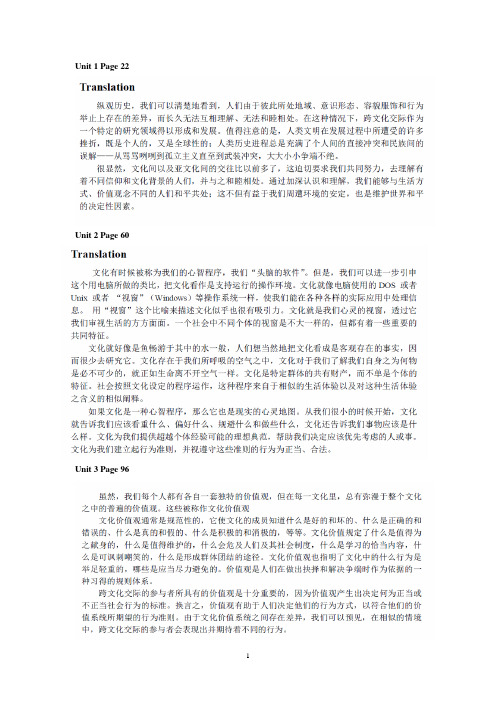
Unit 2 Page 60 Unit 3 Page 96Unit 5 Page 175 Unit 6 Page 215Case 2A common cultural misunderstanding in classes involves conflicts between what is said to be direct communication style and indirect communication style. In American culture, people tend to say what is on their minds and to mean what they say. Therefore, students in class are expected to ask questions when they need clarification. Mexican culture shares this preference of style with American culture in some situations, and that‘s why the students from Mexico readily adopted the techniques of asking questions in class. However, Korean people generally prefer indirect communication style, and therefore they tend to not say what is on their minds and to rely more on implications and inference, so as to be polite and respectful and avoid losing face through any improper verbal behavior. As is mentioned in the case, to many Koreans, numerous questions would show a disrespect for the teacher, and would also reflect that the student has not studied hard enough.Case 3The conflict here is a difference in cultural values and beliefs. In the beginning, Mary didn’t realize that her Dominican sister saw her as a member of the family, literally. In the Dominican view, family possessions are shared by everyone of the family. Luz was acting as most Dominican sisters would do in borrowing without asking every time. Once Mary understood that there was a different way of looking at this, she would become more accepting. However, she might still experience the same frustration when this happened again. She had to find ways to cope with her own emotional cultural reaction as well as her practical problem (the batteries running out).Case 6When a speaker says something to a hearer, there are at least three kinds ofmeanings involved: utterance meaning, speaker’s meaning and hearer’s meaning. In the dialogue, when Litz said ‘How long is she going to stay?’ she meant to say that if she knew how long her mother-in-law was going to stay in Finland, she would be able to make proper arrangements for her, such as taking her out to do some sightseeing. However, her mother-in-law overheard the conversation, and took Litz’s question to mean “Litz does not want me to stay for long”. From the Chinese point of view, it seems to be inappropriate for Litz to ask such a question just two days after her mother-in-law’s arrival. If she feels she has to ask the question, it would be better to ask some time later and she should not let her mother-in-law hear it.Case 7Keiko insists on giving valuable gifts to her college friends, because in countries like Japan, exchanging gifts is a strongly rooted social tradition. Should you receive a gift, and don’t have one to offer in return, you will probably create a crisis. If not as serious as a crisis, one who doesn’t offer a gift in return may be considered rude or impolite. Therefore, in Japan, gifts are a symbolic way to show appreciation, respect, gratitude and further relationship.Keiko obviously has taken those used items from Mary, Ed and Marion as gifts, for she probably doesn’t know that Americans frequently donate their used household items to church or to the community. Mary, Ed and Marion would never consider those used household items given to Keiko as gifts. No wonder they felt very uncomfortable when they received valuable gifts in return.Case 10In Japan, a company is often very much like a big family, in which the manger(s) will take good care of the employees and the employees are expected to devote themselves to the development of the company and, if it is necessary, to sacrifice their own individual interests for the interests of the company, from which, in the long run, the employees will benefit greatly. But for the French, a company is just a loosely- knit social organization wherein individuals are supposed to take care of themselves and their families. Moreover, the way the French make decisions in the family might also be different from the typical Japanese one, which may not often involve females and the power to decide usually lies with the dominating male. As there are such cultural differences between the Japanese and the French, Mr. Legrand’s decision made Mr. Tanaka feel dumbfounded.Case 12In this case, it seems that the Chinese expectations were not fulfilled. First, having two people sharing host responsibilities could be somewhat confusing to the hierarchically minded Chinese. Second, because age is often viewed as an indication of seniority, the Chinese might have considered the youth of their Canadian hosts as slight to their own status. Third, in China, it is traditional for the host to offer a welcome toast at the beginning of the meal, which is the reciprocated by the guests; by not doing so, the Canadian might be thought rude. The abrupt departure of the Chinese following the banquet was probably an indication that they were not pleased with the way they were treated. The Canadians’ lack of understanding of the Chinese culture and the Chinese ways of communication clearly cost them in their business dealings with the visiting delegation.Case 17When these two men separate, they may leave each other with very different impressions.Mr Richardson is very pleased to have made the acquaintance of Mr Chu and feels they have gotten off to a very good start. They have established their relationship on a first-name basis and Mr Chu’s smile seemed to indicate that he will be friendly and easy to do business with. Mr Richardson is particularly pleased that he had treated Mr Chu with respect for his Chinese background by calling him Hon-fai rather than using the western name, David, which seemed to him an unnecessary imposition of western culture.In contrast, Mr Chu feels quite uncomfortable with Mr Richardson. He feels it will be difficult to work with him, and that Mr Richardson might be rather insensitive to cultural differences. He is particularly bothered that, instead of calling him David or Mr Chu, Mr Richardson used his given name, Hon-fai, the name rarely used by anyone, in fact. It was this embarrassment which caused him to smile. He would feel more comfortable if they called each other Mr Chu and Mr Richardson. Nevertheless, when he was away at school in North America he learned that Americans feel uncomfortable calling people Mr for any extended period of time. His solution was to adopt a western name. He chose David for use in such situations.Case 19Talking about what’s wrong is not easy for people in any culture, but people in high-context countries like China put high priority on keeping harmony, preventing anyone from losing face, and nurturing the relationship. It seems that Ron Kelly had to learn a different way of sending message when he was in China. At home in Canada he would have gone directly to the point. But in China, going directly to the problem with someone may suggest that he or she has failed to live up to his or her responsibility and the honor of his or her organization is in question. In high-context cultures like China, such a message is serious and damaging. In low-context cultures, however, the tendency is just to “spit it out”, to get it into words and worry about the result later. Senders of unwelcome messages use objective facts, assuming, as with persuasion, that facts are neutral, instrumental, and impersonal. Indirectness is often the way members of high-context cultures choose to communicate about a problem. Case 21Sometimes our best intentions can lead to breakdowns (故障)in cross-cultural communication. For example, one of the very common manners of touching --- handshaking --- may result in conflict when performed with no consideration of cultural differences. Among middle-class North American men, it is customary to shake hands as a gesture of friendship. When wanting to communicate extra friendliness, a male in the United States may, while shaking hands, grasp with his left hand his friend’s right arm. However, to people of Middle Eastern countries, the left hand is profane (亵渎的) and touching someone with it is highly offensive. Therefore, in Vernon’s eyes, Kenneth was actually an extremely offensive message to him. Case 22In Puerto Rican culture, as in some other Latin American and Eastern cultures, it is not right for a child to keep an eye-contact with an adult who is accusing him or her, while in the United States, failing of meeting other person’s eye accusing him or her would be taken as a sign of guiltiness. As the principal knew little about this cultural difference in using eye-contact, he decided that the girl must be guilty. Generallyspeaking, avoiding eye-contact with the other(s) is often considered as an insult in some cultures, but may signify respect for authority and obedience in other cultures. Case 25For people from the American culture and western European cultures, one’s time should be scheduled into segments or compartments which are to be kept discrete from one another. They prefer to do one thing at a time. They will be annoyed when they have made an appointment with somebody, only to find a lot of other things going on at the same time. They don’t like to interrupt others and be interrupted by other while they are doing something. In contrast, people from many other cultures including the Chinese culture are more likely to operate with several people, ideas, or matters simultaneously. They are more easily distracted and subject to interruptions, which they would not usually mind very much. The miscommunication between Katherine and the director can be ascribed to their lack of knowledge about each other’s way of using time.In this case, to the Chinese director as well as many other Chinese people, it is natural to handle the other things which needed to be dealt with immediately. He may have thought that, in this way, he utilized the time best. But to Katherine and most Westerners, it’s quite different. They tend to do things strictly according to their schedule and appointments with others, which is their concept of using time best.高语境交流和低语境交流(由高到低排列)Japanese, Chinese, Korean, African American, Native American, Arab, Greek, Latin,Italian,English,Frech,Amercian,Scandinavian,German,German-Swiss。
武汉理工大学研究生新编综合英语教程unit6课后答案

Unit 6Passage oneVocabulary1.It is outrageous that these buildings remain empty while thousands of peoplehave no homes.Trans:Word: outrageous:粗暴的;可恶的;离谱的Sentence:成千上万的百姓都没有家而这些建筑物却仍然空着,这真是太离谱了。
2.My brother was expelled from school for bad behavior.Trans:Word: expel:驱逐;除名;开除Sentence:我的弟弟因为行为恶劣而被学校开除了。
3.Severe iron deficiency can cause developmental delay and growth retardation.Trans:Word: retardation:阻滞,延迟Sentence:严重缺铁可引起发育迟缓和生长阻滞。
4. A goal just before half-time rescued the match from mediocrity.Trans:Word: mediocrity:平庸之材Sentence:半场结束前的一个进球,让比赛变得精彩起来。
5.She has campaigned relentlessly for her husband’s release from prison.Trans:Word: relentless:无情的;残酷的;持续地Sentence:为了能让她丈夫出狱,她一直坚持不懈地而奔走。
6.There was a short skirmish between the political party leaders whengovernment announced it was to raise taxes.Trans:Word: skirmish:小争议Sentence:当政府宣布提高税收,政党领导人之间产生了短时间的的小冲突。
《新编跨文化交际英语教程》复习资料U4

Unit 4 Language and CultureSome Ideas Related to language and culture1. Interrelationship between culture and languageEach culture has its own peculiarities and throws special influence on the language system。
For example,referring to the same common domestic animal, English chooses the word “dog", while Chinese has its own character “狗”;Chinese has the phrase “走狗” while English has the expression “running dog”,but the meanings attributed to the two expressions are completely different according to Chinese culture and Western culture respectively. To Westerners, “running dog" has a positive meaning since the word “dog",in most cases, is associated with an image of an animal pet-the favorite friend,thus they have the phrases “lucky dog”(幸运儿), “top dog” (胜利者), “old dog” (老手), “gay dog” (快乐的人), and it is usually used to describe everyday life and behavior,as in “Love me, love my dog” (爱屋及乌),“Every dog has its day” (凡人皆有得意日)。
新编英语教程6第三版练习册答案
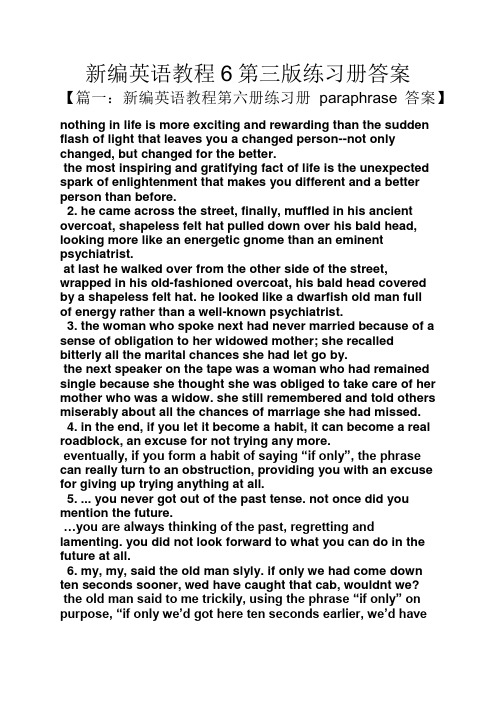
新编英语教程6第三版练习册答案【篇一:新编英语教程第六册练习册paraphrase答案】nothing in life is more exciting and rewarding than the sudden flash of light that leaves you a changed person--not only changed, but changed for the better.the most inspiring and gratifying fact of life is the unexpected spark of enlightenment that makes you different and a better person than before.2. he came across the street, finally, muffled in his ancient overcoat, shapeless felt hat pulled down over his bald head, looking more like an energetic gnome than an eminent psychiatrist.at last he walked over from the other side of the street,wrapped in his old-fashioned overcoat, his bald head coveredby a shapeless felt hat. he looked like a dwarfish old man fullof energy rather than a well-known psychiatrist.3. the woman who spoke next had never married because of a sense of obligation to her widowed mother; she recalledbitterly all the marital chances she had let go by.the next speaker on the tape was a woman who had remained single because she thought she was obliged to take care of her mother who was a widow. she still remembered and told others miserably about all the chances of marriage she had missed.4. in the end, if you let it become a habit, it can become a real roadblock, an excuse for not trying any more.eventually, if you form a habit of saying “if only”, the phrasecan really turn to an obstruction, providing you with an excuse for giving up trying anything at all.5. ... you never got out of the past tense. not once did you mention the future.…you are always thinking of the past, regretting and lamenting. you did not look forward to what you can do in the future at all.6. my, my, said the old man slyly. if only we had come downten seconds sooner, wed have caught that cab, wouldnt we?the old man said to me trickily, using the phrase “if only” on purpose, “if only we’d got here ten seconds earlier, we’d havecaught the cab.” i laughed and understood what he meant. so i foll owed his advice and said, “next time i’ll run faster”.unit 21. moses pleaded a speech defect to rationalize his reluctance to deliver jehovahs edict to pharaoh. moses justified his unwillingness to pass jehovah’s order to pharaoh, saying that he was “slow of speech”.2. yet for all the trouble procrastination may incur, delay can often inspire and revive a creative soul.delay leads to problems. however, in many cases, it can often stimulate the creativity in an artist.3. he notes that speedy action can be embarrassing or extremely costly.he points out that hastiness may give rise to decision which turn out to be humiliating or expensive.4. bureaucratization, which flourished amid the growing burdens of government and the greater complexity of society, was designed to smother policymakers in blankets of legalism, compromise and reappraisal---and thereby prevent hasty decisions from being made.excessive red-tape(官样文章;繁文缛节) developed because public administration was expanding in scope and because society was growing more and more complicated. in this sense, red-tape helped those in charge of policy to be fully engaged in enormous amount of paperwork and judgment, thus making it impossible for an immature decision to result.5. ...many of my friends go through agonies when they face a blank page.…many of my friends have a hard time the moment they attempt to put pen to paper.unit 31. of course, my father is a gentleman of the old school, a member of the generation to whom a good deal of modern architecture is unnerving; but i suspect---i more than suspect, i am convinced---that his negative response was not so much to the architecture as to a violation of his concept of the nature of money.brought up in the old tradition, my father is naturally not prepared to accept the idea of modern architecture; his objection to it, i would assume, indeed i should say i am prettysure, is not a result of his strong dislike of the physical building itself, but rather that of his refusal to change his attitude towards money.2. if a buildings design made it appear impregnable, the institution was necessarily sound, and the meaning of the heavy wall as an architectural symbol dwelt in the prevailing attitude toward money, rather than in any aesthetic theory.if a building was made to look sturdy/invulnerable, it would be accordingly regarded as reliable, and the significance of the thick walls would be measured not by their artistic value, but by their seeming ability to provide a safe location for money.3. in a primitive society, for example, men pictured the world as large, fearsome, hostile, and beyond human control.people in a primitive society, for example, saw the world as an enormous planet full of fear, hatred and disorder.4.the principal function of todays wall is to separate possible undesirable outside air from the controlled conditions of temperature and humidity which we have created inside.today a wall serves mainly as a physical means to protect the desired atmosphere inside from being disturbed by anything unwelcome outside.5. to repeat, it is not our advanced technology, but our changing conceptions of ourselves in relation to the world that determine how we shall build our walls.again, the decisive factor that can influence the design of a wall is not the advancement of science and technology, but our ever-changing attitude towards our place in this world.unit 41. he was a man of exuberant fancy, and, withal, of an authority so irresistible that, at his will, he turned his varied fancies into facts.he was a man rich in whimsies, and intolerant of any act bold enough as to challenge his authority. when his mind caught upon something, absurd as it might be, he would do everything to make sure that it was done in the way he wished.2. when every member of his domestic and political systems moved smoothly in its appointed course, his nature was bland and genial; but whenever there was a little hitch, and some of his orbs got out of their orbits, he was blander and more genialstill, for nothing pleased him so much as to make the crooked straight, and crush down uneven places.when all his subjects behaved in such a manner as they were told to, he could be gentle and kind. and he could even be more so, if anything not conforming to what he expected should occur, because that offered a great chance for him to see the undesirable removed, a thing he was most delighted in doing.3. he could open either door he pleased: he was subject to no guidance or influence but that of the aforementioned impartial and incorruptible chance.he enjoyed total freedom to choose what to do: he was not directed or influenced by anyone as to which door to open. the only thing that was decisive in terms of his fate was the above-mentioned chance, granted to all the accused alike.4. this element of uncertainty lent an interest to the occasion which it could not otherwise have attained.the fact that no one could tell for sure what might happen (to the accused) made this from of trial more attractive than any other form of justice.5. thus the masses were entertained and pleased, and the thinking part of the community could bring no charge of unfairness against this plan; for did not the accused person have the whole matter in his own hands?thus people enjoyed coming here to watch, and those guided by reason in the society could not possibly question the fairness of this form of trial; for was it not the fact that all the accused were given equal chances to make decisions upon their won destiny?unit51. this semi-barbaric king had a daughter as blooming as his most florid fancies, and with a soul as fervent and imperious as his own.this semi-barbaric king had a daughter as exuberant as the wildest of his notions, a daughter who possessed a nature as fierce and tyrannical as his own.2. of course, everybody knew that the deed with which the accused was charged had been done.it was, of course, known to all that he was guilty of the offense of conducting an affair with the princess.3. ...; but the king would not think of allowing any fact of this kind to interfere with the workings of the tribunal, in which he took such great delight and satisfaction.…,even though the king was well aware that the love affair had taken place, he would still refuse to let the normal method of deciding guilt or innocence be disturbed, because he was extremely enthusiastic about his way of setting matters of this kind.4. ...; but gold, and the power of a womans will, had brought the secret to the princess..…; but because she had the money, and above all, because her determination was so irresistible, the princess was able to get access to the secret.5. he understood her nature, and his soul was assured that she would never rest until she had made plain to herself this thing, hidden to all other lookers-on, even to the king.he knew her so well that he was perfectly positive that she would never cease to search for the secret, which remained unknown to all other spectators, even to the king himself.unit 61. there seems to be a general assumption that brilliant people cannot stand routine; that they need a varied, exciting life in order to do their best.it is generally believed that a colorless life can freeze a creative mind, and that only a colorful life can inspire a man to creative work.2. the outstanding characteristic of mans creativeness is the ability to transmute trivial impulses into momentous consequences.one of the wonders human creativity works is that man can make full use of even insignificant feelings to produce far-reaching results.3. an eventful life exhausts rather than stimulates.a life full of diversions stops man’s creativity instead of activating it.4. it is usually the mediocre poets, writers, etc.,who go in search of stimulating events to release their creative flow.only literary artists of an average type rely on excitements in life as a source for their creative work./ great poets, writers, etc., create works of art out of trivial and common subject.5. people who find dull job unendurable are often dull people who do not know what to do with themselves when at leisure. people who are unable to see how to be patient with repetitious work are usually those who are unable to see where to find fun in life when it comes to relaxation.【篇二:新编英语教程6 练习与答案】txt>practice testsforadvanced english(2)主编张华鸿第五、六册本书的主要特点:1.2.前言编写本书的目的:目前英语专业三年级所使用的由上海外国语大学李观仪教授主编的〈新编英语教程〉紧扣精读课文编写练习,实用性、针对性强。
李观仪《新编英语教程》学习指南【词汇短语+课文精解+全文翻译+练习答案】(Unit 6)
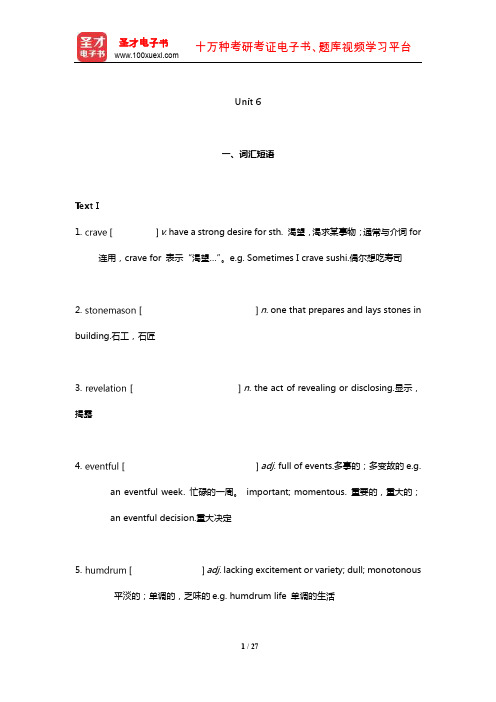
Unit 6一、词汇短语Text I1. v. have a strong desire for sth. 渴望,渴求某事物;通常与介词for连用,crave for 表示“渴望…”。
e.g. Sometimes I crave sushi.偶尔想吃寿司2. n. one that prepares and lays stones in building.石工,石匠3. n. the act of revealing or disclosing.显示,揭露4. adj. full of events.多事的;多变故的e.g.an eventful week. 忙碌的一周。
important; momentous. 重要的,重大的;an eventful decision.重大决定5. adj. lacking excitement or variety; dull; monotonous平淡的;单调的,乏味的e.g. humdrum life 单调的生活6. v. to cover completely in a liquid. 沉浸;浸入e.g. Theelectrodes are immersed in liquid. 电极被浸没在液体中。
to engage whollyor deeply; absorb.专心于…。
e.g. He’s really becoming immersed in hiswork. 他开始真正地专注于自己的工作。
7. n. art or work of a carpenter木工工作8. n.an official right to be the onlyperson or company allowed to make or sell a new product for a certain period of time.专利e.g. P&G applied for a patent on its cookies. 宝洁公司为其饼干申请了专利。
新编跨文化交际英语教程1-6单元翻译(Word可编辑版)

纵观历史,我们可以清楚地看到,人们由于彼此所处地域、意识形态、容貌服饰和行为举止上存在的差异,而长久无法互相理解、无法和睦相处。
在这种情况下,跨文化交际作为一个特定的研究领域得以形成和发展。
值得注意的是, 人类文明在发展过程中所遭受的许多挫折, 既是个人的, 又是全球性的: 人类历史进程总是充满了个人问的直接冲突和民族间的误解一一从骂骂咧咧到孤立主义直至到武装冲突, 大大小小争端不绝。
很显然, 文化间以及亚文化问的交往比以前多了, 这迫切要求我们共同努力, 去理解有着不同信仰和文化背景的人们, 并与之和睦相处。
通过加深认识和理解, 我们能够与生活方式、价值观念不同的人们和平共处: 这不但有益于我们周遭环境的安定, 也是维护世界和平的决定性因素。
Translation Unit 2文化有时候被称为我们的心智程序, 我们“头脑的软件”。
但是, 我们可以进一步引中这个用电脑所做的类比, 把文化看作是支持运行的操作环境。
文化就像电脑使用的Dos 或者unix 或者“视窗”(windows) 等操作系统一样, 使我们能在各种各样的实际应用中处理信息。
用“视窗”这个比喻来描述文化似乎也很有吸引力。
文化就是我们心灵的视窗,透过它我们审视生活的方方面面。
一个社会中不同个体的视窗是不大一样的, 但都有着一些重要的共同特征。
文化就好像是鱼畅游于其中的水一般, 人们想当然地把文化看成是客观存在的事实, 因而很少去研究它。
文化存在于我们所呼吸的空气之中, 文化对于我们了解我们自身之为何物是必不可少的, 就正如生命离不开空气一样。
文化是特定群体的共有财产, 而不单是个体的特征。
社会按照文化设定的程序运作, 这种程序来自于相似的生活体验以及对这种生活体验之含义的相似阐释。
如果文化是一种心智程序, 那么它也是现实的心灵地图。
从我们很小的时候开始, 文化就告诉我们应该看重什么、偏好什么、规避什么和做些什么, 文化还告诉我们事物应该是什么样。
新编英语教程6 练习与答案
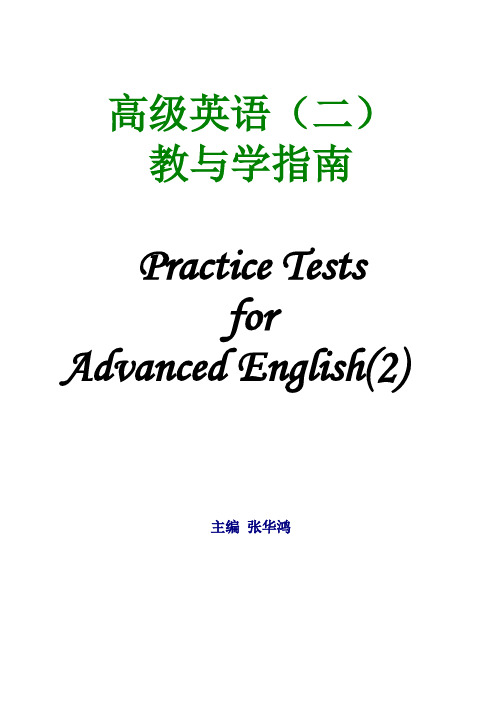
高级英语(二)教与学指南Practice Testsfor Advanced English(2)主编张华鸿前言编写本书的目的:目前英语专业三年级所使用的由上海外国语大学李观仪教授主编的〈新编英语教程〉第五、六册本书的主要特点:1.紧扣精读课文编写练习,实用性、针对性强。
2.对于同义词辨析的练习配以详尽的解释和相应的例句,旨在帮助学生真正弄懂并掌握这些词的用法。
3.设计了旨在提高学生语言运用熟练程度的系列练习,分别为:一、英语释义二、英语句型转换三、汉译英四、完形填空五、成段改错4.练习均配有参考答案。
本书由张华鸿主编。
高华老师负责编写同义词辨析部分;郑艳丽老师负责编写句型转换部分;张华鸿老师负责编写英语释义、汉译英、完形填空和成段改错四部分,以及全书的编排、设计、整合与审编定稿等工作。
本书承华南师范大学外国语言文化学院领导的大力支持,以及英语系高年级教研室全体同仁的热心帮助,编者在此表示衷心的感谢。
编者2003年1月于华南师范大学外文学院ContentsUnit One: VESUVIUS ERUPTS 3 Unit Two: THE FINE ART OF PUTTING THINGS OFF16 Unit Three: WALLS AND BARRIERS28 Unit Four: THE LADY,OR THE TIGER?40 Unit Five: THE LADY,OR THE TIGER?53 Unit Six: DULL WORK65 Unit Seven:BEAUTY 74 Unit Eight: APPETITE84 Unit Nine: A RED LIGHT FOR SCOFFLAWS98 Unit Ten: STRAIGHT-A ILLITERACY114131 Unit Eleven: ON CONSIGNING MANUSCRIPTS TOFLOPPY DISCS AND ARCHIVES TO OBLIVIONUnit Twelve: GRANT AND LEE147 Unit Thirteen: EUPHEMISM163 Unit Fourteen: THAT ASTOUNDING CREATOR---NA TURE175 Unit Fifteen: TEACHING AS MOUNTAINEERING191Unit OneTEXT IVESUVIUS ERUPTSI. Paraphrase the parts underlined in the following:So the letter which you asked me to write on my uncle’s death has made you eager to hear about the terrors and also the hazards I had to face 1when left at Misenum, for I 2broke off at the beginning of this part of my story.I took a bath, dined, and then dozed 3fitfully for a while. For several days past there had been earth 4tremors which were not particularly alarming because they are frequent in Campania: but that night the shocks were so violent that everything fell as if it were not only shaken but overturned.I don’t know whether I sh ould call this courage or 5folly on my part (I was only seventeen at the time) but I 6called for a volume of Livy and went on reading as if I had nothing else to do.Up came a friend of my uncle’s who had just come from Spain to join him. When he saw us sitting there and me actually reading, he scolded us both —me for my 7foolhardiness and my mother for allowing it.By now it was dawn [25 August in the year 79], but the light was still dim and 8faint. The buildings round us were already 9tottering, and the open space we were in was too small for us not to be in real and 10imminent danger if the house collapsed. This finally 11decided us to leave the town. We were followed by a panic- stricken mob of people wanting to act on someone else’s decision 12in preference to their own (a point in which fear looks like 13prudence), who 14hurried us on our way by pressing hard behind in a dense crowd.We also saw the sea sucked away and apparently forced back by the earthquake: at any rate it receded from the shore so that 15quantities of sea creatures were left 16stranded on dry sand. On the landward side a fearful black cloud was 17rent by forked and quivering bursts of flame, and parted to reveal great tongues of fire, like flashes of lightning magnified in size.At t his point my uncle’s friend from Spain 18spoke up still more urgently: “If your brother, if your uncle is still alive, he will want you both to be saved; if he is dead, he would want you to survive him so why put off your escape?”Soon afterwards the cloud sank down to earth and covered the sea; it had already 19blotted out Capri and hidden the promontory of Misenum from sight. Then my mother 20implored, entreated, and commanded me to escape as best I couldI looked round: a dense black cloud was coming up behind us, spreading over the earth like a flood. “Let us leave the road while we can still see,” I said, “or we shall be knocked down and 21trampled underfoot in the dark by the crowd behind.”You could hear the shrieks of women, the 22wailing of infants, and the shouting of men; some were calling their parents, others their children or their wives, trying to recognize them by their voices. People 23bewailed their own fate or that of their relatives, and there were some who 24prayed for death in their terror of dying. Many 25besought the aid of the gods, but still more imagined there were no gods left, and that the universe was plunged into eternal darkness forevermore. There were people, too, who 26added to the real perils byinventing 27fictitious dangers: some reported that part of Misenum had collapsed or another part was on fire, and though their tales were false they found others to believe them. A 28gleam of light returned, but we took this to be a warning of the approaching flames rather than daylight.I could boast that not a groan or cry of fear 29escaped me in these perils, 30had I not derived some poor consolation in my mortal lot from the belief that the whole world was dying with me and I with it.We returned to Misenum where we 31attended to our physical needs as best we could, and then spent an anxious night alternating between hope and fear.II. Rewrite the followingFor each of the sentences below, write a new sentence as close in meaning as possible to the original sentence by using the given words as the beginning.1. We were followed by a panic-stricken mob of people wanting to act on someone else’s decision in preference to their own, who hurried us on our way by pressing hard behind in a dense crowd.Panic-stricken, the mob of people close behind us ___________ _ 2. We replied that we would not think of considering our own safety as long as we were uncertain of his.Unless we were ___________________________________3. There were people, too, who added to the real perils by inventing fictitious dangers: some reported that part of Misenum had collapsed or another part was on fire, and though their tales were false they found others to believe them.By reporting that part of Misenum had collapsed or another part was on fire, _______ 4. I could boast that not a groan or cry of fear escaped me in these perils, had I not derived some poor consolation in my mortal lot from the belief that the whole world was dying with me and I with it.Because I derived some poor consolation_____________________5. Several hysterical individuals made their own and other people’s calamities seem ludicrous in comparison with their frightful predictions.Compared with several individuals’ frightful predictions, the calamities____________ III. Translate the following into English1. 还未等我们坐下来喘息,夜幕已经降临,这黑暗使你觉得不是在无月色或多云的夜晚,而像是在灯火熄灭的紧闭的房间里。
6(第二版)全新版大学英语综合教程4-Unit6课后练习答案
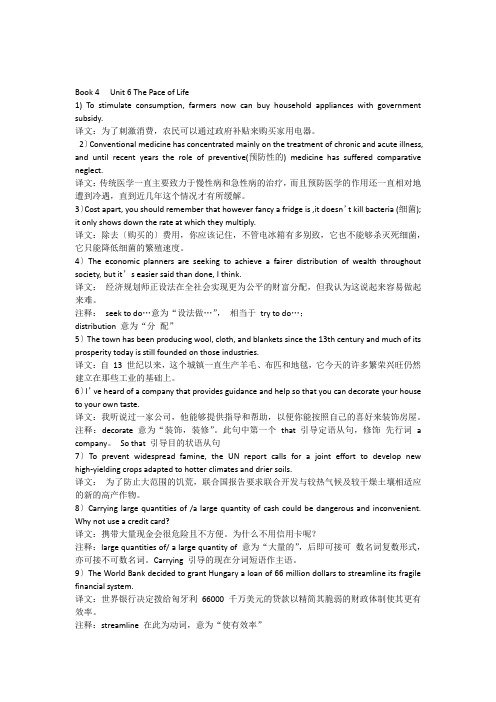
Book 4Unit 6 The Pace of Life1) To stimulate consumption, farmers now can buy household appliances with government subsidy.译文:为了刺激消费,农民可以通过政府补贴来购买家用电器。
2〕Conventional medicine has concentrated mainly on the treatment of chronic and acute illness, and until recent years the role of preventive(预防性的) medicine has suffered comparative neglect.译文:传统医学一直主要致力于慢性病和急性病的治疗,而且预防医学的作用还一直相对地遭到冷遇,直到近几年这个情况才有所缓解。
3〕Cost apart, you should remember that however fancy a fridge is ,it doesn’t kill bacteria (细菌); it only shows down the rate at which they multiply.译文:除去〔购买的〕费用,你应该记住,不管电冰箱有多别致,它也不能够杀灭死细菌,它只能降低细菌的繁殖速度。
4〕The economic planners are seeking to achieve a fairer distribution of wealth throughout society, but it’s easier said than done, I think.译文:经济规划师正设法在全社会实现更为公平的财富分配,但我认为这说起来容易做起来难。
注释:seek to do…意为“设法做…”,相当于try to do…;distribution 意为“分配”5〕The town has been producing wool, cloth, and blankets since the 13th century and much of its prosperity today is still founded on those industries.译文:自13 世纪以来,这个城镇一直生产羊毛、布匹和地毯,它今天的许多繁荣兴旺仍然建立在那些工业的基础上。
- 1、下载文档前请自行甄别文档内容的完整性,平台不提供额外的编辑、内容补充、找答案等附加服务。
- 2、"仅部分预览"的文档,不可在线预览部分如存在完整性等问题,可反馈申请退款(可完整预览的文档不适用该条件!)。
- 3、如文档侵犯您的权益,请联系客服反馈,我们会尽快为您处理(人工客服工作时间:9:00-18:30)。
para2
Among the borrowed notions by which his barbarism had become semified was that of the public arena, in which, by exhibition of manly and beastly valor, the minds of his subjects were refined and cultured. by which his barbarism had become semified arena: place or scene of activity or conflict valor: bravery Culture: train, nurture
4. Hitch a problem that is not very serious 5. Assert oneself to state firmly that something is true; to speak or behave in a firm, confident way 6. Poetic justice a situation in which someone gets exactly what they deserve w hen they have done something bad
“thumbs down” meant his death. The sentiment of the crowd was usually the decisive factor. Thousands of gladiator died annually in amphitheatres of the Roman Empire. Gladiatorial combat was probably the cruelest sport ever widely accepted in an advanced civilization.
When every member of his domestic and political systems moved smoothly in its appointed course, his nature was bland and genial, bland and genial: composed and gracious its appointed course: the direction decided by him Translation: 当国家的每个人民及政治系统里的每个政客都遵守他的规则行事, 他呈现的会是他温和宽大的一面
Background Knowledge
Gladiators were armed fighters performing for the public in ancient Rome. Throughout the history of ancient Rome, it remained fashionable to commemorate the dead with a gladiatorial fight. Gladiatorial games became so popular that by the first century B.C. they were presented throughout the Roman Empire many times
Shows in the arena at Rome lasted all day. In the morning there were mock, bloodless battles. In the afternoon the true fights began to the accompaniment of music. Trainers stood by their gladiators and urged slaves with whips to drive them on. When a gladiator fell, the provider of the games had to decide whether he would be permitted to live. “ Thumbs up” from the sponsor meant that the man would live;
Discussion 1
Read the title: The Lady, or the Tiger? What is the difference and relation between a lady and a tiger?
Discussion 2
The topic of this text is Justice. How can you combine the topic of Justice with the above-mentioned two (lady and tiger)?
Translation
But whenever there was a little hitch, and some of his orbs got out of their orbits, he was blander and more genial still, for nothing pleased him so much as to make the crooked straight, and crush down uneven places. 每当事情有 点不顺他的心且有些人民或属下犯错时,他也依旧 温和宽大,没有什么比让人改邪归正及平息反对声浪更能讨 他欢喜了。
a year to celebrate holidays. Many Romans believed that gladiatorial contests promoted the ideal of toughness and courage. Most gladiator were prisoners of war, but some of them were convicted criminals , or occasionally, Christian. Gladiatorial combats were fought one to one as a rule, but occasionally mass battles were fought.
He was a man of exuberant fancy, and, withal, of an authority so irresistible that, at his will, he turned his varied fancies into facts. exuberant: wild and excessive withal: moreover, besides At one’s will: decided by somebody Translation: 他是一位充满想象力的人,且国王这个职称赋予他诱人的权力,以 致于他可以随心所欲将他的想象世界变成现实世界。
He was greatly given to self-communing; and, when he and himself agreed upon anything, the thing was done. self-communing: discuss matters with oneself He was very much in the habit of discussing matters with himself. Translation: 他也是个与自我融成一体的人,以 致于当他与他自己同意任何 事,事情就这样决定了。
Translation
In the olden time there lived a semi-barbaric king, whose ideas, though somewhat polished and sharpened by the progressiveness of distant Latin neighbors, were still large, florid, and untrammeled, as became the half of him which was barbaric. 远古的国家住了一位野蛮残酷的国王,虽然他的思想观 念都受到拉丁远邻的渐进影响,然而其思想却仍然非常 广泛、天马行空且自由自在,也因此造就他个性中野蛮 残 酷的一面。
7. Emanate to come from a particular place 8. Wend one’s way Go or walk in a direction 9. Air a piece of music that has a simple tune
10. Hilarious extremely funny
Discussion 3
Group discussion and presentation My understanding of justice in law
Reading through
Page 55 True of false
para1
In the olden time there lived a semi-barbaric king, whose ideas, though somewhat polished and sharpened by the progressiveness of distant Latin neighbors, were still large, florid, and untrammeled, as became the half of him which was barbaric. Olden: 古昔的,古老的 Semi1) Exactly half 2) Partly, in some degree, e.g. semi-conscious, semi-official florid: wild untrammeled: unrestrained Become: be suitable for, befit Whose ideas… was barbaric: whose ideas were coarse, wild and unrestrained, which made him a truly semi-barbaric king, even though the progressive ideas of the people who spoken Latin in distant places had refined and improved his ideas to some extent.
